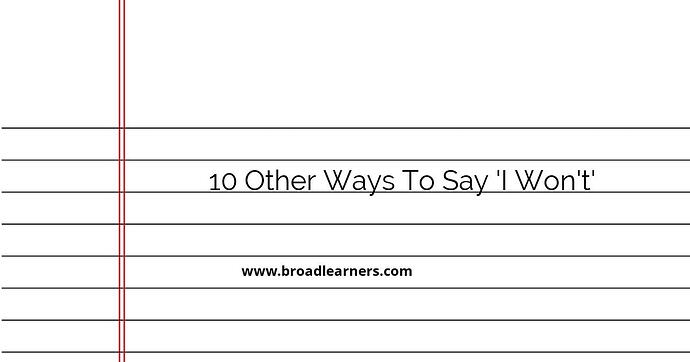When expressing refusal or disagreement, it's important to have a variety of phrases at your disposal. Instead of repeatedly saying 'I won't,' you can use these alternative expressions to convey your message effectively:
- I am not going to
- I refuse to
- I cannot
- I am unwilling to
- I have no intention of
- I am disinclined to
- I will not be
- I am not interested in
- I have decided against
- I am not prepared to
Let's explore each alternative in more detail:
1. I am not going to
This phrase is a straightforward and direct way to express refusal. It clearly states that you have made a decision not to do something.
Example: I am not going to attend the party tonight. I have other commitments.
2. I refuse to
'I refuse to' indicates a strong and determined refusal. This phrase emphasizes your firm stance on the matter.
Example: I refuse to compromise my principles for personal gain.
3. I cannot
'I cannot' implies that there are external factors preventing you from doing something. It suggests that it is beyond your control.
Example: I cannot lend you money because I don't have any myself.
4. I am unwilling to
'I am unwilling to' expresses a lack of desire or motivation to do something. It conveys a sense of reluctance.
Example: I am unwilling to work overtime without proper compensation.
5. I have no intention of
'I have no intention of' indicates a clear lack of desire or plans to do something. It suggests that you have made a deliberate decision.
Example: I have no intention of participating in the competition. It's not my area of interest.
6. I am disinclined to
'I am disinclined to' implies a mild form of refusal or lack of interest. It suggests a slight aversion to the proposed action.
Example: I am disinclined to accept the job offer due to the long commute.
7. I will not be
'I will not be' is a concise way to express refusal. It indicates that you have made a decision not to be involved in a particular situation.
Example: I will not be attending the meeting tomorrow as I have a conflicting appointment.
8. I am not interested in
'I am not interested in' clearly states a lack of interest or enthusiasm for a particular activity or proposition.
Example: I am not interested in joining the committee. I prefer to focus on other projects.
9. I have decided against
'I have decided against' implies that you have carefully considered the options and made a conscious choice not to proceed.
Example: I have decided against pursuing a career in medicine. It's not the right fit for me.
10. I am not prepared to
'I am not prepared to' suggests that you are not willing to undertake a particular action or responsibility at the present moment.
Example: I am not prepared to take on additional work until my current workload decreases.
By using these alternative phrases, you can effectively express your refusal or disagreement without relying solely on 'I won't.' Remember to consider the context and tone of the conversation to choose the most appropriate phrase.
Did I miss anything? Respond below
